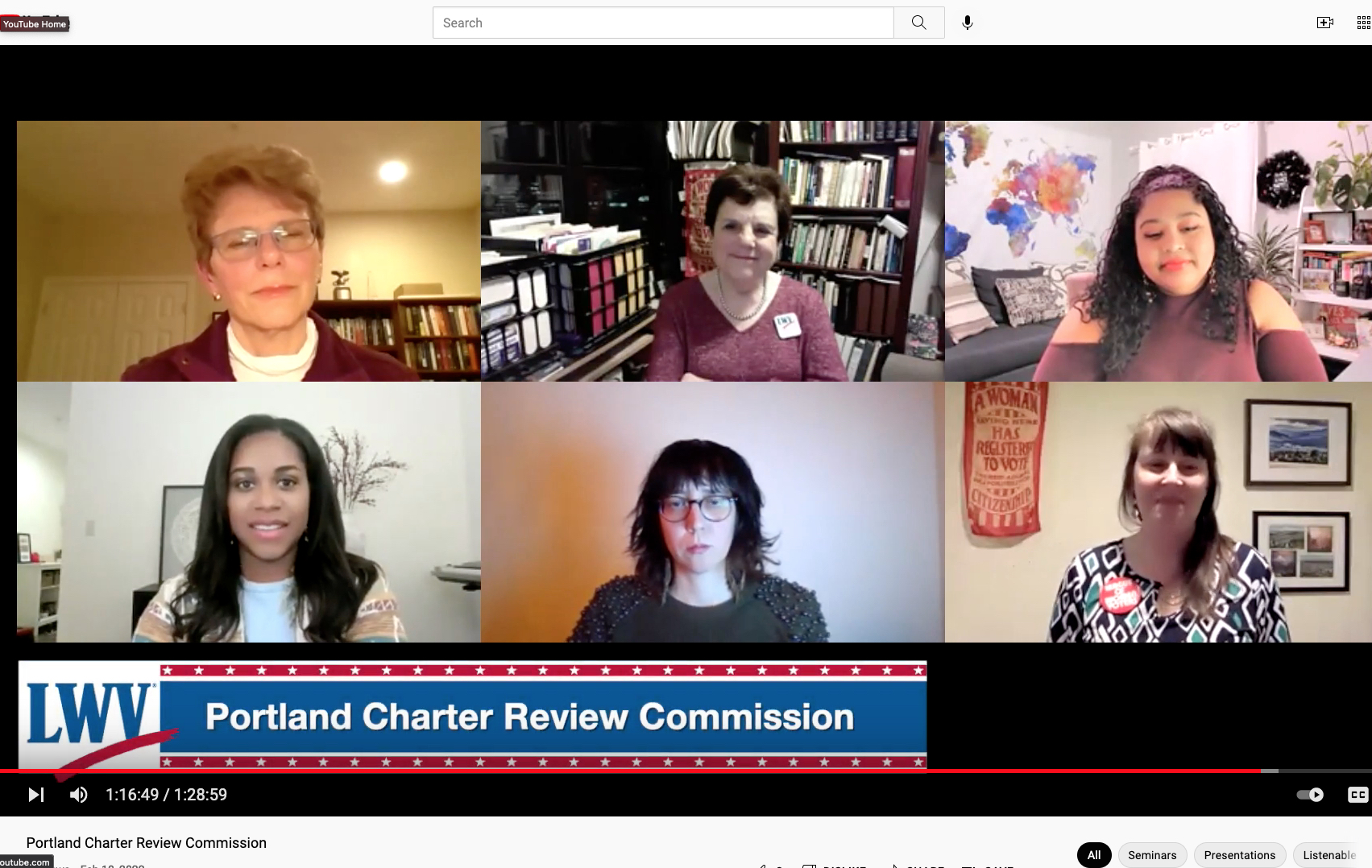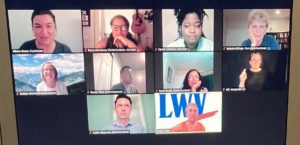The charter Commission
Every ten years, the Portland City Council appoints twenty community volunteers to form a Charter Review Commission. The Commission’s job is analyzing Portland’s City Charter and recommending improvements. The current Charter Commission started its work 18 months ago. This group reflects the diversity of Portland. Its work has included thorough research, extensive public input, and deep reflection.
Since 1913, Portland has used the commission form of city government, and voters have retained that form of government in eight separate elections — most recently 15 years ago. All other cities our size abandoned the commission form of government long ago. Will this year’s charter review be the one that succeeds in changing Portland’s government?
The Portland League’s Role
Members of LWVPDX have followed the Portland Charter Commission’s work by attending its meetings and testifying. We have been raising our voice about ways this process can strengthen democracy. We also held an educational panel discussion about the Commission’s work in February 2022. The recording of that panel discussion may be viewed here. Links to our testimony are in the sections below.
After a two-year study of Portland’s government ending in 2019, the Portland League concluded that Portland’s government must be changed. We issued a comprehensive report about City Government and formed an advocacy position statement summarizing our hopes for change. This statement motivated our efforts to follow the Charter Commission’s work. Our advocacy position also led us to conclude that the reforms proposed by the Commission will help our city move into a brighter future.
The Portland League has endorsed the proposed Charter amendment
At its June 29 meeting, the League of Women Voters of Portland Board voted to endorse the 2022 Charter Amendment.
This amendment will be a ballot measure on Portland voters’ November 8, 2022, ballots. The Commission’s sixth progress report includes the charter reform amendment prepared by the City Attorney’s office. A summary of the ballot measure is on pages 7-20.
The three major changes are:
-
- Elect Candidates Using Ranked Choice Voting
- Expand City Council to 12 Members, Electing Three Members Each from Four New Geographic Districts
- City Council Sets Policy; Mayor Elected Citywide Runs Day-to-Day Operations
This amendment conforms substantially with our position on City Government. We also support the proposed ranked-choice voting method based on the LWV of Oregon study and position on Election Methods and LWVUS position on Voter Representation and Electoral Systems.
The League believes this measure improves democracy
We wholeheartedly support passing this measure. Our analysis shows it will improve democracy in Portland. It is our best option to make Portland’s City Government more responsive, representative and effective.
CAMPAIGN ADVOCACY: Before the election, the Portland League will work with other good-government organizations to support this measure. Our goal is to help voters understand the advantages these changes offer all Portlanders.
VOTER EDUCATION: In addition to the League’s advocacy efforts, the League of Women Voters Education Fund will, as usual, provide impartial voter education. Our voter service will cover the pros and cons of this measure and other 2022 measures.
Some historY: The Commission’s recent steps leading to their final recommendation
Beginning in February 2022, the Commission released a series of progress reports: one February 2022 progress report, a second progress report and a third report both in March, a fourth report in April, and a fifth report in May. All along, there were opportunities for public comment. Many organizations and individuals commented. The commission received 1,600 public comments and listened to 15 hours of verbal testimony. They also received 4022 responses to their survey. The League offered testimony based on our research and positions.
The commission’s’ fifth report included the City Attorney’s Office draft language for the charter amendments. It was the focus of four public hearings in May. LWVPDX comments were submitted on May 12 and May 30. Our president, Debbie Kaye, also gave oral testimony, summarizing our key points. The Sixth Progress Report includes the final changes to the commissions proposal with updated language for the revised Charter that voters are considering in November 2022.
Themes of the Charter Commission’s Work
In the early part of the Commission’s work, the commission members focused on two themes: form of government and city council elections.
-
- The Form of Government Subcommittee developed recommendations about reforming the commission form of government, revising the roles of Mayor and City Council, changing how bureaus are managed, and deciding whether Portland needs a professional city manager to manage the city bureaus.
- The Council Elections Subcommittee developed recommendations about the methods and timing of voting in city council elections and the number and constituency of city councilors, including whether councilors should be elected by district or citywide, or both.
On March 31, 2022, the Portland Charter Review Commission held an important meeting that included a vote on the key reforms they will send to voters this fall. After hearing testimony from the public, including testimony from the LWVPDX Board, the Commissioners unanimously advanced a package of proposals to change the city’s charter. They agreed on three main changes:
-
-
- Use Ranked-Choice Voting to allow voters to rank candidates in order of their preference
- Expand the city council to a total of 12 members, elected from four new geographic districts with three members representing each district
- Shift the focus of city council to setting policy, with a mayor elected citywide to run administrative operations with the help of a professional city administrator
-
These proposals generally aligned with the reforms suggested by LWVPDX in our testimony shared at the meeting:
-
-
- Establish city council as a legislative body, not an administrative or executive one.
- Institute a city manager.
- Increase the number of city councilors to 10-12, plus the mayor.
- Retain election of the mayor and auditor on a citywide basis with Ranked-Choice Voting.
- Enhance proportional representation by creating multi-member districts and using Ranked-Choice Voting to elect the City Council.
-
Read our full March 31, 2022, Charter Commission Testimony.
LWVPDX Community Education on the Charter Commission
The Portland League hosted a panel of key commissioners to discuss their work on February 9, 2022, over Zoom: 
-
- Julia Meier, the Charter Commission Project Manager
- Charter Commissioner Candace Avalos
- Charter Commissioner Amira Streeter
- Charter Commissioner Melanie Billings-Yun
The Commissioners talked about what brought them to join the Commission (and devote so much of their time to it over the past year). The four panelists also shared their greatest hopes for what could come out of the Charter Review. It was clear that the future of the reforms they recommend will depend on groups like the League of Women Voters to educate and engage the public on critical issues of local governance.
Find the links to the video and podcast here. Review Julia Meier’s slideshow about the Charter Review.
League Advocacy
The League of Women Voters of Portland commented on the Commission’s work six times.
- President Debbie Kaye presented testimony about transparency in June 2021.
- In October 2021, we used our Election Methods and City Government position statements to advocate for key reforms in council elections and changes to Portland’s form of government. (The group’s February 2022 progress report reflects several of the changes we urged, such as increasing the size of City Council, considering district-based elections, and shifting City Council positions into legislative roles.)
- In March 2022, we provided testimony in support of the general direction the Commission was headed. We emphasized the priorities of their Areas of Agreement that aligned with our 2020 City Government position statement.
- LWVPDX submitted written testimony on May 12 and on May 30. Our testimony strongly supported the final proposal, but suggested a few changes and clarified information about ranked-choice voting for multi-member districts.
- During this time, we have mobilized Portlanders to share their views with the Commission. We also kept members informed about the ongoing work of the Commission.
League Positions Ground our Advocacy
Our study and consensus position about City Government guided our involvement in the Charter Commission’s work. In the fall of 2019, the League of Women Voters of Portland Education Fund published its report on a 2012-19 study of Portland’s City Government. (The study report is posted here.) Using this study and a panel discussion of the results for background, League members discussed the study and answered “consensus questions.” Members’ answers led to an updated City Government advocacy position, which the Board approved in January 2020.
Here is an excerpt from our position:
“The highest priorities for change are to improve citizen representation by increasing the number of commissioners, to institute a city manager, and to establish the city council as a legislative or policy-setting body. We also support electing some or all city councilors by district.”
Read the LWVPDX full City Government position here.
LWVPDX advocacy to the Charter Commission is also rooted in our positions on election methods, which come from our state and national LWV partners. The LWVOR position on Election Methods and the LWVUS position on Voter Representation and Electoral systems support ranked choice voting for single-winner elections and multi-member districts. Key statements in these positions are quoted below.
“The League of Women Voters of Oregon does not believe that plurality voting is the best method for promoting democratic choice in all circumstances. For single-winner systems, the League supports ranked-choice voting; we do not support range or approval voting. The League of Women Voters of Oregon supports election systems that elect policy-making bodies–legislatures, councils, commissions, and boards–that proportionally reflect the people they represent.”
“LWVUS promotes an open governmental system that is representative, accountable, and responsive. We encourage electoral methods that provide the broadest voter representation possible and are expressive of voter choices.
“Whether for single or multiple winner contests, the League supports electoral methods that:
- Encourage voter participation and voter engagement
- Encourage those with minority opinions to participate, including under-represented communities
- Are verifiable and auditable
- Promote access to voting
- Maximize effective votes/minimize wasted votes
- Promote sincere voting over strategic voting
- Implement alternatives to plurality voting
- Are compatible with acceptable ballot-casting methods, including vote-by-mail
‘The LWVUS believes in representative government. The League supports electoral systems that elect policy-making bodies–-legislatures, councils, commissions, and boards—that proportionally reflect the people they represent.”
